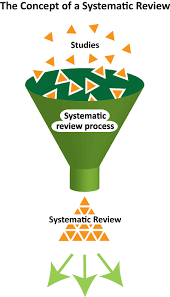NRSG8002 - Norwegian Research School of Global Health
NRS8002 Systematic review and meta-analysis
Autumn 2022
This course aims to introduce PhD students and post-doc researchers to systematic review methodology and familiarize them with the process of conducting a systematic review. The focus will be on systematic reviews of interventions, but reviews addressing qualitative, prevalence, prognostic and diagnostic questions will also be presented.
Organiser: NRSGH at NTNU in collaboration with NIPH
Course leaders: Heather Ames (NIPH) heather.ames@fhi.no and Lillebeth Larun (NIPH) lillebeth.larun@fhi.no
Course description and ECTS credits:
The course consists of webinars, digital resources, course work, assignments, three-days of interactive teaching and the possibility to submit an exam. A pass on the exam and the two assignments will give 5 ECTS credits (approximately 125 hours of work in total for in classroom time, independent learning, assignments, and the exam).
From the 24th of August to 21st of September there will be a digital meeting followed by digital small group work. The focus will be on the steps for conducting a systematic review. Online learning resources will be made available. After completing this part of the course, students will submit a group assignment and an individual assignment. From the 26th to the 28th of September there will be a three-day interactive seminar with lectures and groupwork, either in person or digitally dependent on the situation. In the period from the 29th of September to the 31st of October students will write their exam, a protocol for a systematic review, and will have the opportunity for follow-up supervision from their instructor and a librarian.
Important dates and times (GMT+2):
|
August 24th |
Kick off seminar: |
|
August 31st |
Group work 1 |
|
September 7th |
Group work 2 |
|
September 14th |
Group work 3 and Group assignment due |
|
September 19th |
Group work 4 |
|
September 21st |
Individual assignment due |
|
September 26th-28th |
Interactive teaching seminar |
|
September 29th-October 31st |
Supervision with a search specialist (1 hour) and a systematic review specialist (1 hour) |
|
October 31st |
Exam due |
|
December 5th |
Exam results given |
Kick-off seminar with groupwork 9:00 - 14:00, groupwork will be from 9:00-12:00, and the interactive three-days seminar will be whole day teaching: 9:00-17:00
Recommended previous knowledge: The participants are required to have knowledge of research methods at a master’s level. The participants also need good written and oral English skills. The course gives priority to members of the Norwegian Research School of Global Health, but participants from other institutions can be considered if there are spaces available. If the assignments are approved, attendance is more than 80% and the exam is a pass, the student is accredited with 5 ECTS credits.
When you are accepted to the course, you will receive a welcome package with more details around the assignments, the exam, links to online learning materials and the reading list.
PRESENTATIONS:
Information package (updated 31.08.22)
Kick-off seminar, 24th August - Introduction and Types of systematic reviews
Groupwork:
Searching for literature by Marit Johansen and Ingvild Kirkehei
Interactive teaching seminar 26-28 Sept:
Updated program
Monday 26.09:
by Lillebeth Larun and Heather Armes
Types of systematic reviews and how to frame and ask a specific question
How to decide what data analysis approach to use. Part 1-quantitative and qualitative data
What is a QES and how to choose a synthesis method
Tuesday 27.09:
by Unni Gopinathan
Presentation Study selection
Article RCT childhood immunization by Usman
Study selection - exercise
by Lars Jørun Langøien
Presentation Data extraction
Data extraction - exercise
by Atle Fretheim
Risk of bias
by Ingvild Kirkehei
Searching for literature - Exercise
Wednesday 28.09:
by Lillebeth Larun and Heather Armes
GRADE and GRADE CERQual
CERQual vaccination
How to present results
Protocol development and team experience and composition
Learning outcomes:
By the end of the course participants will:
- Have knowledge of the basic elements in a systematic review protocol
- Be able to use existing templates to write a systematic review protocol for an intervention review or a qualitative evidence synthesis
- Understand the role of a systematic review
- Understand the criteria that defines a systematic review
- Have knowledge of different types of systematic reviews
- Know how to formulate a research question and decide which type of systematic review is most appropriate
- Develop and plan study inclusion and exclusion criteria
- Have basic knowledge of developing a search strategy
- Develop and critically appraise a sheet for data extraction
- Appraise risk of bias or methodological limitations of included studies with explicit criteria in a transparent way
- Be able to do and understand meta-analysis, narrative synthesis and/or qualitative synthesis methods
- Understand the pros and cons of combining outcomes of included studies
- Be able to explore and appraise clinical, methodological and statistical heterogeneity
- Be able to appraise the quality of the evidence with GRADE or GRADE CERQual
- Understand “summary of findings” tables
- Have knowledge of different digital tools that might help in conducting a systematic review
- To understand the roles that your personal perspectives can have on influencing your systematic review
Registration (the course is now fullbooked)
Deadline for registration is 1 June, 2022
Remember also to apply in Søknadsweb
This PhD-course is only available for members. Become a member?
.

